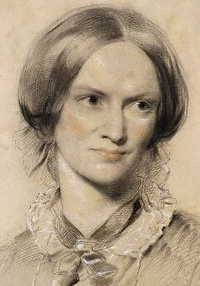
Charlotte Brontë was an English novelist and poet, the eldest of the three Brontë sisters who survived into adulthood and whose novels became classics of English literature.

Emily Elizabeth Dickinson was an American poet. Little-known during her life, she has since been regarded as one of the most important figures in American poetry. Dickinson was born in Amherst, Massachusetts, into a prominent family with strong ties to its community. After studying at the Amherst Academy for seven years in her youth, she briefly attended the Mount Holyoke Female Seminary before returning to her family's home in Amherst. Evidence suggests that Dickinson lived much of her life in isolation. Considered an eccentric by locals, she developed a penchant for white clothing and was known for her reluctance to greet guests or, later in life, even to leave her bedroom. Dickinson never married, and most of her friendships were based entirely upon correspondence.

Sexual Personae: Art and Decadence from Nefertiti to Emily Dickinson is a 1990 work about sexual decadence in Western literature and the visual arts by scholar Camille Paglia, in which she addresses major artists and writers such as Donatello, Sandro Botticelli, Leonardo da Vinci, Edmund Spenser, William Shakespeare, Johann Wolfgang von Goethe, Samuel Taylor Coleridge, Lord Byron, Emily Brontë, and Oscar Wilde. Following Friedrich Nietzsche, Paglia argues that the primary conflict in Western culture is between the binary forces of the Apollonian and Dionysian, Apollo being associated with order and symmetry, and Dionysus with chaos, disorder, and nature. The book became a bestseller, received critical reviews from numerous feminist scholars, and was praised by numerous literary critics.

Helen Hunt Jackson was an American poet and writer who became an activist on behalf of improved treatment of Native Americans by the United States government. She described the adverse effects of government actions in her history A Century of Dishonor (1881). Her novel Ramona (1884) dramatized the federal government's mistreatment of Native Americans in Southern California after the Mexican–American War and attracted considerable attention to her cause. Commercially popular, it was estimated to have been reprinted 300 times and most readers liked its romantic and picturesque qualities rather than its political content. The novel was so popular that it attracted many tourists to Southern California who wanted to see places from the book.
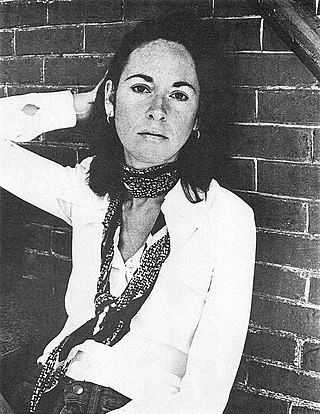
Louise Elisabeth Glück is an American poet and essayist. She won the 2020 Nobel Prize in Literature, whose judges praised "her unmistakable poetic voice that with austere beauty makes individual existence universal". Her other awards include the Pulitzer Prize, National Humanities Medal, National Book Award, National Book Critics Circle Award, and Bollingen Prize. From 2003 to 2004, she was Poet Laureate of the United States.

Frederick Goddard Tuckerman was an American poet, remembered mostly for his sonnet series. Apart from the 1860 publication of his book Poems, which included approximately two-fifths of his lifetime sonnet output and other poetic works in a variety of forms, the remainder of his poetry was published posthumously in the 20th century. Attempts by several 20th century scholars and critics to spark wider interest in his life and works have met with some success and Tuckerman is now included in several important anthologies of American poetry. Though his works appear in 19th century anthologies of American poetry and sonnets, this reclusive contemporary of Emily Dickinson, sometime correspondent of Nathaniel Hawthorne, Ralph Waldo Emerson and Henry Wadsworth Longfellow, and acquaintance of Alfred, Lord Tennyson, remains in relative obscurity.
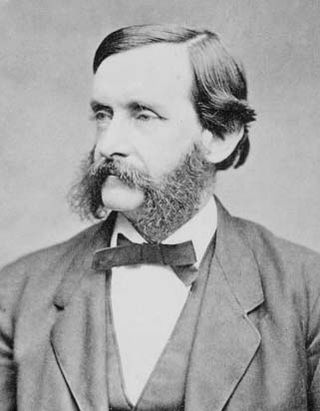
Thomas Wentworth Higginson was an American Unitarian minister, author, abolitionist, politician, and soldier. He was active in abolitionism in the United States during the 1840s and 1850s, identifying himself with disunion and militant abolitionism. He was a member of the Secret Six who supported John Brown. During the Civil War, he served as colonel of the 1st South Carolina Volunteers, the first federally authorized black regiment, from 1862 to 1864. Following the war, he wrote about his experiences with African American soldiers and devoted much of the rest of his life to fighting for the rights of freed people, women, and other disfranchised peoples. He is also remembered as a mentor to poet Emily Dickinson.

Dame Flora Louise Shaw, Lady Lugard, was a British journalist and writer. She is credited with having coined the name Nigeria.

Letters from a Farmer in Pennsylvania is a series of essays written by the Pennsylvania lawyer and legislator John Dickinson (1732–1808) and published under the pseudonym "A Farmer" from 1767 to 1768. The twelve letters were widely read and reprinted throughout the Thirteen Colonies, and were important in uniting the colonists against the Townshend Acts in the run-up to the American Revolution. According to many historians, the impact of the Letters on the colonies was unmatched until the publication of Thomas Paine's Common Sense in 1776. The success of the letters earned Dickinson considerable fame.

Mabel Loomis Todd or Mabel Loomis was an American editor and writer. She is remembered as the editor of posthumously published editions of Emily Dickinson's poetry and letters and also wrote several novels and books about her travels with her husband, astronomer David Peck Todd, as well as co-authoring a textbook on astronomy.
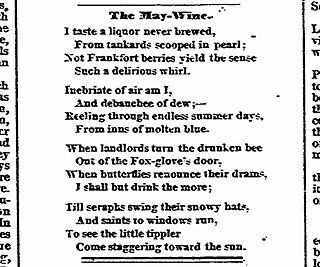
"I taste a liquor never brewed" is a lyrical poem written by Emily Dickinson first published in the Springfield Daily Republican on May 4, 1861, from a now lost copy. Although titled "The May-Wine" by the Republican, Dickinson never titled the poem so it is commonly referred to by its first line.
Cristanne Miller received her PhD in 1980 from the University of Chicago, and was for many years the W.M. Keck Distinguished Service Professor at Pomona College. Since 2006 she has taught at the University at Buffalo in New York, where she is SUNY Distinguished Professor and Edward H. Butler Professor of English.
Margaret Maher was an Irish-American long-term domestic worker in the household of American poet Emily Dickinson.

"Success is counted sweetest" is a lyric poem by Emily Dickinson written in 1859 and published anonymously in 1864. The poem uses the images of a victorious army and one dying warrior to suggest that only one who has suffered defeat can understand success.
Rebecca Hazelton Stafford is an American poet, editor and critic.

Susan Huntington Gilbert Dickinson was an American writer, poet, traveler, and editor. She was the sister-in-law of poet Emily Dickinson.

Emily Norcross Dickinson was a member of the Dickinson family of Amherst, Massachusetts, and the mother of American poet Emily Dickinson.

"Hope' is the thing with feathers" is a lyric poem in ballad meter written by American poet Emily Dickinson, The manuscript of this poem appears in Fascicle 13, which Dickinson compiled around 1861. It is one of 19 poems included in the collection, in addition to the poem "There's a certain Slant of light." With the discovery of Fascicle 13 after Dickinson's death by her sister, Lavinia Dickinson, "'Hope' is the thing with feathers" was subsequently published in 1891 in a collection of her works under the title Poems, which was edited and published by Thomas Wentworth Higginson and Mabel Loomis Todd.
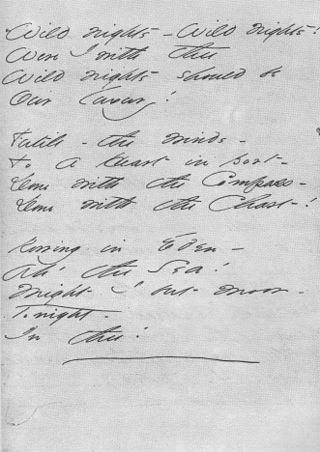
"Wild Nights – Wild Nights!" is an 1861 poem by Emily Dickinson. It was included in her posthumous collection of Poems, Second Series, published November 9, 1891.